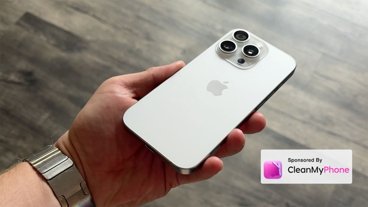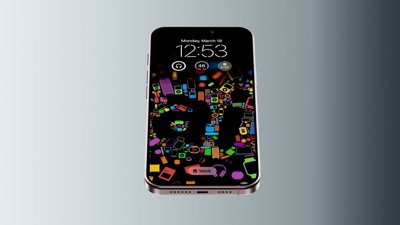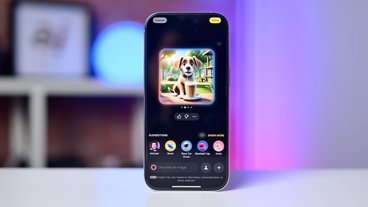Apple's 2015 iPhone update will purportedly add some features introduced in the iPad Air 2 last year, including an upgrade to 2 gigabytes of RAM and the possibility of pre-installing the Apple SIM, giving users the ability to select a carrier on their own out of the box.
A person familiar with Apple's future product plans, who has provided reliable information in the past, indicated to AppleInsider that the so-called "iPhone 6s," and presumably the Plus version as well, will in fact be upgraded to 2 gigabytes of RAM. Apple has used a single gigabyte of RAM in its iPhone lineup dating back to the iPhone 5, which launched in 2012.
It was earlier that same year that Apple introduced one gigabyte of RAM in its custom A-series CPUs with the third-generation iPad with Retina display. It's expected that Apple will follow the same approach again, bringing iPad memory upgrades to the next iPhone, since the iPad Air 2 included 2 gigabytes of RAM embedded in its A8X chip last year.
Additional RAM would allow iOS to leave background tasks and tabs in Safari open for longer without a need to reload or refresh. But additional RAM can also come with costs to battery life, as memory constantly consumes power.
The same source also told AppleInsider that Apple is strongly considering shipping its next-generation handset with the Apple SIM pre-installed. That piece, which also made its debut with the iPad Air 2, allows consumers to sign up for mobile data plans from any participating carrier directly from the Settings app without long-term contracts and to switch providers at any time.
Such a move would likely meet staunch resistance from wireless carriers, who have forced Apple to scrap similar plans in the past. Even those carriers that signed on to support the Apple SIM in the iPad Air 2 placed limitations on its usefulness when not purchased directly from Apple, and leading U.S. carrier Verizon abstained entirely.
Competition among carriers has been increasingly fierce in recent years, as the airwaves become relatively commoditized and consumers less brand-loyal. Presumably, carriers will be reticent to cede a direct sales relationship with customers, perhaps more so than they were when Apple first floated its virtual SIM idea in 2010.
"The operators are accusing Apple of trying to gain control of their relationship with their mobile customers with the new SIM," the Financial Times reported then. That opinion is not likely to have changed.
What has changed is Apple's position in the market. The iPhone is now the most popular consumer product since the microwave, making it impossible for carriers to ignore.
If Apple does decide to ship the Apple SIM in the new iPhone, carriers are unlikely to eschew support completely — as Verizon has done until now. Rather, the balance of probability tilts in favor of AT&T-style "dedication," in which handsets purchased from carriers would be locked to that network, but those purchased unlocked directly from Apple would be free to pick-and-choose plans at will.
If Apple follows its usual annual release schedule, the next-generation iPhone models should be announced in September, and will be released to the public soon after. It's expected that the new devices will focus on under-the-hood changes, as Apple's "S" upgrades tend to leave the exterior of the handset largely unchanged from its predecessor.
 AppleInsider Staff
AppleInsider Staff














 Charles Martin
Charles Martin




 Malcolm Owen
Malcolm Owen
 Andrew O'Hara
Andrew O'Hara







87 Comments
2GB RAM is no brainer. Now all we need is bump 16GB to 32GB. If Apple is all about delivering the best products and user experience that should be a no brainer too.
Dear Mr. Operators. You had years to attempt a mutually-beneficial relationship with your mobile customers prior to the iPhone. Instead, you took every opportunity to gouge and milk your customer for everything. You have failed miserably. You provide the "dumb pipe". That is the only relationship I - and many - mobile users have with you. I do not want anything more from you. You will not get anything more from me. Do that, and do it right, and you'll keep my business. Fail me, and I will look elsewhere... easily.
We can all thank Apple for blazing the way, wrestling control away from the telecoms and back to the consumer. Everyone - including Fandroids - should be grateful for the disruption that Apple has introduced to what was once a stranglehold.
We can all thank Apple for blazing the way, wrestling control away from the telecoms and back to the consumer. Everyone - including Fandroids - should be grateful for the disruption that Apple has introduced to what was once a stranglehold.
Yep. Especially since Google tried to perpetuate the carrier stranglehold by giving them what they wanted. This is why, even today, carriers push Android phones like crazy.
I don't know if the carriers can fight ?SIM now. They're weakening on a number of fronts.
Dear Mr. Operators. You had years to attempt a mutually-beneficial relationship with your mobile customers prior to the iPhone. Instead, you took every opportunity to gouge and milk your customer for everything. You have failed miserably. You provide the "dumb pipe". That is the only relationship I - and many - mobile users have with you. I do not want anything more from you. You will not get anything more from me. Do that, and do it right, and you'll keep my business. Fail me, and I will look elsewhere... easily.
We can all thank Apple for blazing the way, wrestling control away from the telecoms and back to the consumer. Everyone - including Fandroids - should be grateful for the disruption that Apple has introduced to what was once a stranglehold.
Yes. Lets forward this to cable /DLS internet providers as well and hope Apple has a way to shake up the 'dumb pipes' there.
why stop at 32GB? Why not 128GB? That would be an even better user experience. What about drop the price by $200? even better?
/s
When will people learn. Apple needs high margins to keep the eco-sytem and R&D and customer service running at a top level.
IF YOU WANT TO PLAY YOU GOTTA PAY.
YOU GET WHAT YOU PAY FOR.
If you want cheap shit go buy android.
Meh.. I would not be surprised if Apple makes 32Gb the standard, bumps middle to 128, and 256 the high end. MAINLY when they start pushing 4k Video and Photos that will happen..
Unlikely will happen with the 6s, likely the iPhone 7.. By then 4k, in ~2 years, should be fairly standard...